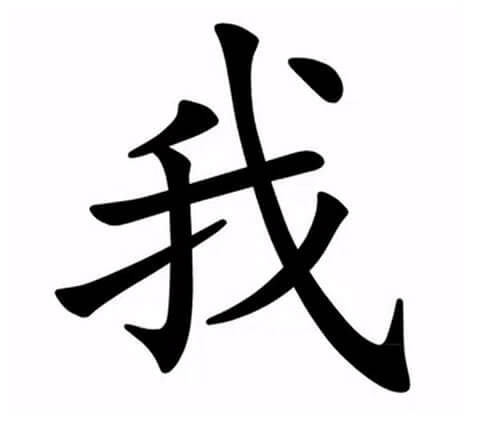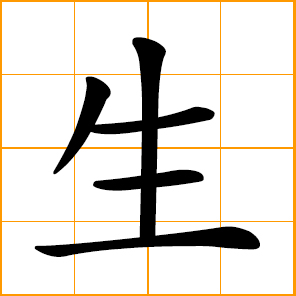|
|
Post by mikegarrison on Apr 28, 2019 11:43:51 GMT -5
When I first went to Georgis Tech, I hung out with some undergrads from Georgia. ABCs, American Born Chinese. One kid just blew my mind. He grew up in Augusta and spoke no Chinese, but he had a deep southern drawl. I'm looking at his face but hearing this drawl. I kind of freaked. My mom taught a kid in high school who was Chinese (from China) but had learned to speak English in Germany, so had a pronounced German accent. |
|
|
|
Post by Wolfgang on May 3, 2019 1:17:29 GMT -5
I'm at the stage now where I really LOVE studying Chinese and am not afraid of it. I really really look forward to seeing Chinese characters everywhere. I'm obviously not fluent, not even close. But it's becoming addictive.
|
|
|
|
Post by Wolfgang on May 7, 2019 20:17:12 GMT -5
I'm seeing the logic behind the Mandarin character construction based on radicals and roots but sometimes, I find it baffling. Why would a character that means "I" or "me," one of the simplest and most important words in all languages, be so complicated in construction? I would think it would be more simple and bold in construction like a straight line or a square. Instead, we get this:  |
|
|
|
Post by vup on May 7, 2019 21:05:09 GMT -5
I'm seeing the logic behind the Mandarin character construction based on radicals and roots but sometimes, I find it baffling. Why would a character that means "I" or "me," one of the simplest and most important words in all languages, be so complicated in construction? I would think it would be more simple and bold in construction like a straight line or a square. Instead, we get this:  It’s a dancing human. You just have to look closely. |
|
|
|
Post by vup on May 7, 2019 21:06:28 GMT -5
Dance is the true essence of our spirit
|
|
|
|
Post by Wolfgang on May 9, 2019 22:17:39 GMT -5
I like it when Mandarin is logical or has some poetic beauty.
The word for business is “buy sell.” (mai3 mai4)
The word for traitor is “sell country” (i.e., to sell out your country). (mai4 guo2)
|
|
|
|
Post by Wolfgang on May 12, 2019 15:34:16 GMT -5
I'm seeing the logic behind the Mandarin character construction based on radicals and roots but sometimes, I find it baffling. Why would a character that means "I" or "me," one of the simplest and most important words in all languages, be so complicated in construction? I would think it would be more simple and bold in construction like a straight line or a square. Instead, we get this:  It’s a dancing human. You just have to look closely. I know you’re just trying to be helpful but there’s already a word for dance, human and jump, so to entangle the word “I” with dance doesn’t fly, babe. |
|
|
|
Post by Wolfgang on May 15, 2019 21:30:57 GMT -5
The Chinese word for "birth" or "bear a child" is shēng. The symbol is below. What I don't get is, this symbol looks nothing like "birth" or some mother giving birth. LOL!  |
|
|
|
Post by XAsstCoach on May 15, 2019 23:01:02 GMT -5
The Chinese word for "birth" or "bear a child" is shēng. The symbol is below. What I don't get is, this symbol looks nothing like "birth" or some mother giving birth. LOL!  From www.chinasage.info/dictionary/dolookup.php生shēng sheng1WG shêng to be born; to give birth; life; to grow OriginA simplified picture of a plant growing out of the ground Radical Index 100 used in: 姓 xìng (surname) ; 星 xīng (star) ; 胜 shèng (victory) Full information for 生 You of course know to address a male "Mr." its 先生, or first born. |
|
|
|
Post by XAsstCoach on May 15, 2019 23:02:37 GMT -5
I'm seeing the logic behind the Mandarin character construction based on radicals and roots but sometimes, I find it baffling. Why would a character that means "I" or "me," one of the simplest and most important words in all languages, be so complicated in construction? I would think it would be more simple and bold in construction like a straight line or a square. Instead, we get this:  This is interesting... 我wǒ wo3WG wo I; me; my Made up of [戈 gē spear radical 62, 扌 shǒu hand radical 64] OriginHand grasping a spear |
|
|
|
Post by Wolfgang on May 20, 2019 1:42:30 GMT -5
|
|
|
|
Post by Wolfgang on May 23, 2019 17:27:49 GMT -5
I just realized today for the first time that Mandarin doesn't have circular character strokes. It's an odd thing. You'd think that with their brushes, they would've drawn circles or ovals all over the place. But, the closest thing the Chinese have to a circle is a square, which you see in bunches. Also, I don't think it has anything to do with their inability to draw curves because a lot of their lines are curved. So, the Chinese were aware of curves.
I don't know why, but this realization is freaking me out!
|
|
|
|
Post by vup on Jun 1, 2019 12:30:56 GMT -5
Quiero aprender español. Compré “Cien Años de Soledad” por Gabriel García Marquez.
|
|
|
|
Post by Wolfgang on Jun 1, 2019 13:44:02 GMT -5
Quiero aprender español. Compré “Cien Años de Soledad” por Gabriel García Marquez. A friend of mine said that he doesn't want to know you unless you've read this book. |
|
|
|
Post by volleyguy on Jun 1, 2019 15:29:27 GMT -5
Quiero aprender español. Compré “Cien Años de Soledad” por Gabriel García Marquez. is one of the great novels without doubt. It is well worth reading from both a literary and entertainment perspective. If you want great literature with an eye to improving your spanish literacy, I have some other recommendations based on style and syntax: Crónica de una muerte anunciada (Chronicle of a Death Foretold) by Garcia Márquez is also an excellent option. It is a more straight-forward plot and has fewer of the stylistic adornments in language which made Cien Años so unique (and difficult). El llano en llamas (The Burning Plain) by Juan Rulfo, Mexico. A collection of short stories depicting rural life in stark but humanistic prose. Also, the novel Pedro Páramo, which turns many universal myths on their heads. Anything by Jorge Luis Borges, Argentina. El Áleph and Laberintos. A Nobel Laureate and master of crystalline prose, he wrote mainly short stories and essays, and was a major intellectual figure. Anything by Octavio Paz, Mexico. El laberinto de la soledad (The Laberynth of Solitude), El Arco y la Lira. Like Borges, he was also a Nobel Laureate and primarily a Poet and essayist. Elena Poniatowska (France/Mexico) is a journalist and author and a fantastic writer. Keep in mind that like many languages, Spanish has regional and cultural differences. Mexican spanish is akin to Mid-West (or newscast) English, and I have skewed towards more neutral styles. Castellano is the spanish spoken in most of Spain, and it is a bit more formal and traditional (and spoken castellano Spanish features the lisp on the s), while Spanish in the Caribbean is super-fast, joyful and expressive. Spanish in South America is a great blend of structure, style and intellectualism, and you will find many great authors from Chile, Argentina, Venezuela, Colombia and Peru. Poetry is also a great way to learn the language and there are many great options: Pablo Neruda (Chile), Gabriela Mistral (Chile), Sor Juan de la Cruz (Spain), Sor Juana Ines de la Cruz (Mexico), Julia de Burgos (Puerto Rico), Alfonsina Storni (Argentina) in addition to Borges and Paz. You can find these authors at the public library or if you want to purchase them, you can try www.thriftbooks.com which is an awesome website to get used books inexpensively. |
|